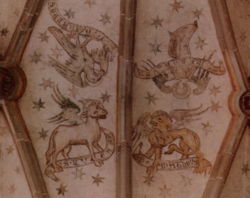
Power animal
Encyclopedia

Anthropology
Anthropology is the study of humanity. It has origins in the humanities, the natural sciences, and the social sciences. The term "anthropology" is from the Greek anthrōpos , "man", understood to mean mankind or humanity, and -logia , "discourse" or "study", and was first used in 1501 by German...
, Ethnography
Ethnography
Ethnography is a qualitative method aimed to learn and understand cultural phenomena which reflect the knowledge and system of meanings guiding the life of a cultural group...
and Sociology
Sociology
Sociology is the study of society. It is a social science—a term with which it is sometimes synonymous—which uses various methods of empirical investigation and critical analysis to develop a body of knowledge about human social activity...
. A tutelary spirit guides, helps or protects individuals, lineages and nations. In the shamanic
Shamanism
Shamanism is an anthropological term referencing a range of beliefs and practices regarding communication with the spiritual world. To quote Eliade: "A first definition of this complex phenomenon, and perhaps the least hazardous, will be: shamanism = technique of ecstasy." Shamanism encompasses the...
worldview
World view
A comprehensive world view is the fundamental cognitive orientation of an individual or society encompassing the entirety of the individual or society's knowledge and point-of-view, including natural philosophy; fundamental, existential, and normative postulates; or themes, values, emotions, and...
, everything is alive, bearing an inherent virtue, power and wisdom. In this context power animal(s) represent a person's connection to all life, their qualities of character, and their power.
Power animals are common to shamanic practice in both Eurasia and the Americas. They are the helping or ministering spirit or familiar
Familiar spirit
In European folklore and folk-belief of the Medieval and Early Modern periods, familiar spirits were supernatural entities believed to assist witches and cunning folk in their practice of magic...
which empowers individuals and is essential for success in any venture undertaken.
In the shamanic worldview, everyone has power animals or tutelary
Tutelary
A tutelary is a deity or spirit who is a guardian, patron or protector of a particular place, geographic feature, person, lineage, nation, culture or occupation. Both tutelary and tutelar can be used as either a noun or an adjective...
spirits which empower and protect them from harm, like guardian spirits or angels in the Abrahamic Traditions. In these traditions, the power animal may also lend its ward
Magic (paranormal)
Magic is the claimed art of manipulating aspects of reality either by supernatural means or through knowledge of occult laws unknown to science. It is in contrast to science, in that science does not accept anything not subject to either direct or indirect observation, and subject to logical...
or charge the wisdom or attributes of its kind.
See also
- Animal worshipAnimal worshipAnimal worship refers to religious rituals involving animals, especially in pre-modern societies, such as the glorification of animal deities, or animal sacrifice....
- AnimismAnimismAnimism refers to the belief that non-human entities are spiritual beings, or at least embody some kind of life-principle....
- FamiliarFamiliar spiritIn European folklore and folk-belief of the Medieval and Early Modern periods, familiar spirits were supernatural entities believed to assist witches and cunning folk in their practice of magic...
- FylgjaFylgjaIn Norse mythology, a fylgja is a supernatural being or creature which accompanies a person in connection to their fate or fortune...
(Norse) - GeniusGenius (mythology)In ancient Roman religion, the genius was the individual instance of a general divine nature that is present in every individual person, place or thing.-Nature of the genius:...
(Roman) - NagualNagualIn Mesoamerican folk religion, a Nagual or Nahual is a human being who has the power to magically turn him- or herself into an animal form: most commonly a donkey, turkey, or dog, but also other and more powerful animals such as the jaguar and puma.Such a Nagual is believed to use his powers for...
(Native America) - Patron saintPatron saintA patron saint is a saint who is regarded as the intercessor and advocate in heaven of a nation, place, craft, activity, class, clan, family, or person...
- ShamanismShamanismShamanism is an anthropological term referencing a range of beliefs and practices regarding communication with the spiritual world. To quote Eliade: "A first definition of this complex phenomenon, and perhaps the least hazardous, will be: shamanism = technique of ecstasy." Shamanism encompasses the...
- TotemTotemA totem is a stipulated ancestor of a group of people, such as a family, clan, group, lineage, or tribe.Totems support larger groups than the individual person. In kinship and descent, if the apical ancestor of a clan is nonhuman, it is called a totem...
- TutelaryTutelaryA tutelary is a deity or spirit who is a guardian, patron or protector of a particular place, geographic feature, person, lineage, nation, culture or occupation. Both tutelary and tutelar can be used as either a noun or an adjective...
- Uay (Native American)
- VahanaVahanaVāhana denotes the being, typically an animal or mythical entity, a particular deva is said to use as a vehicle. In this capacity, the vāhana is often called the deity's mount. Upon the partnership between the deva and his vāhana is woven much iconography and mythology...
(Hindu)

